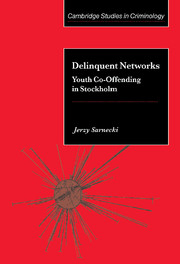Book contents
- Frontmatter
- Contents
- List of figures
- List of tables
- Acknowledgements
- 1 Social Network Analysis and Criminology
- 2 The Aims and Method of the Study
- 3 Actors and Links
- 4 The Choice of Co-offenders.
- 5 The Network
- 6 The Network Connections of Juveniles Admitted to Secure Care Facilities
- 7 Football Hooligans in the Networks
- 8 Politically and Ideologically Motivated Offences
- 9 Ethnicity
- 10 The ‘Ängen Gang’
- 11 Conclusions
- Appendix
- Notes
- References
- Index
8 - Politically and Ideologically Motivated Offences
Published online by Cambridge University Press: 08 October 2009
- Frontmatter
- Contents
- List of figures
- List of tables
- Acknowledgements
- 1 Social Network Analysis and Criminology
- 2 The Aims and Method of the Study
- 3 Actors and Links
- 4 The Choice of Co-offenders.
- 5 The Network
- 6 The Network Connections of Juveniles Admitted to Secure Care Facilities
- 7 Football Hooligans in the Networks
- 8 Politically and Ideologically Motivated Offences
- 9 Ethnicity
- 10 The ‘Ängen Gang’
- 11 Conclusions
- Appendix
- Notes
- References
- Index
Summary
This chapter is also devoted to a specific and in some ways atypical group among the delinquent youths studied, namely individuals who during the last six months of 1995 were suspected of crimes described by the Swedish state security police as ‘national security related’ (Säkerhetspolisen, State security police 1996, 1997, 1998). Members of the research project made an application for and were granted permission to examine the extent of these individuals' involvement in networks of young delinquents in Stockholm between 1991 and 1995.
The analysis is based on a list provided by the security police containing information pertaining to ninety-seven individuals. The list included:
eighty-two persons suspected of extreme right-wing offences
fourteen persons suspected of extreme left-wing offences
In criminological terms, the offences for which these individuals were suspected would fall under the rubric of ‘hate crimes’ (Hamm 1994) and/or political crimes with more-or-less clearly defined ideological motives. Information concerning these individuals' crimes came from offence reports recorded in the police's RAR register, that is, the same register as that from which the network study data was drawn. Each county police authority (including Stockholm) employs someone to carry out a continual examination of RAR reports in order to pick out ‘national security-related’ offences with the aid of specific criteria. These sweeps cover eighty-one different offence codes. One of the units within the security police then has the responsibility of maintaining a register of all the relevant offence reports (State security police 1998: 5). The information provided is further examined by this unit and constitutes the basis for yearly reports (State security police 1996, 1997, 1998).
- Type
- Chapter
- Information
- Delinquent NetworksYouth Co-Offending in Stockholm, pp. 113 - 120Publisher: Cambridge University PressPrint publication year: 2001

